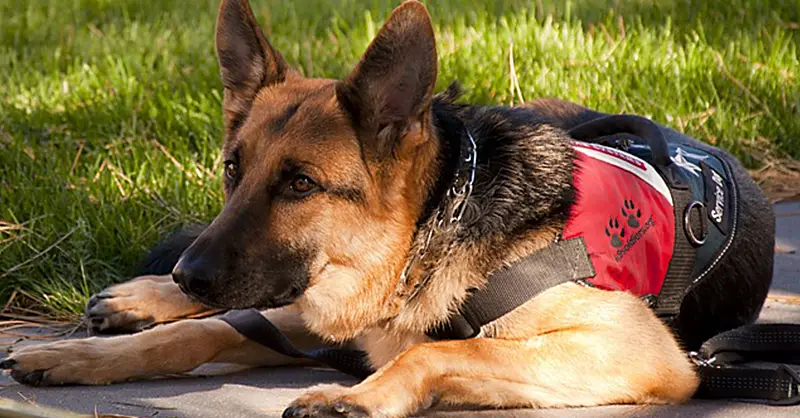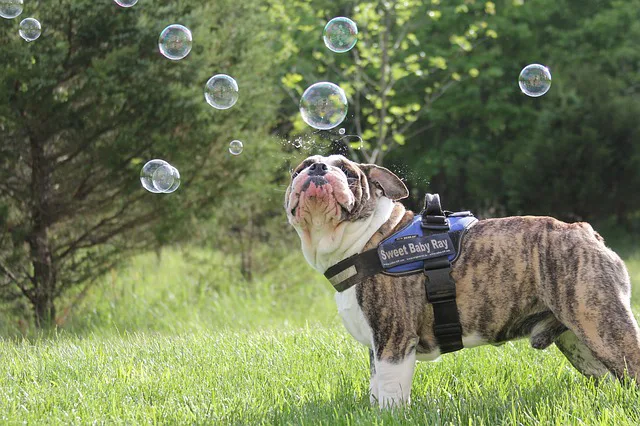Home Page › Blog › How to Certify a Service Dog
How to Certify a Service Dog

Wondering how you can certify a service dog? You should first be aware that “certifying” a service dog may not mean what you think.
What the law says: Under U.S. service dog laws, you cannot qualify for a service dog just by obtaining a certification. Certifications are obtained by service dog owners as an optional step for personal convenience, but they are not mandatory. Thus, while service dog certifications can be beneficial, a third party cannot insist on seeing a certificate in lieu of proper verification procedures.
Requirements for being a service dog handler:
- The handler must have a physical or psychiatric disability.
- The service dog must be trained to perform a job or task relating to that disability.
- The service dog must be able to work in public places without causing a disruption.
- The handler must be able to confirm they own a service dog by answering two permitted questions under the ADA.
Keep reading: We will cover some frequently asked questions regarding service dogs and clarify some common misconceptions.
Q1 – What is a service dog?
A service dog is a highly trained canine that provides assistance to people who suffer from disabilities. These disabilities can include physical and/or psychiatric conditions. Some of the most common psychiatric conditions qualifying for assistance from service dogs are severe depression and PTSD – the service dogs that help handlers with these conditions are known as psychiatric service dogs (PSDs).
Service dog owners are protected under various US laws, including the Americans with Disabilities Act (ADA), the Fair Housing Act, and the Air Carrier Access Act.
Service dogs are allowed to accompany their handlers in places open to the public and on airplanes. Service dog owners can also live with their dogs free of charge, even in residential buildings that ban all pets.
Q2 – What tasks do service dogs provide?
A service dog can be trained to perform an incredible variety of tasks. Here are just a few examples of the amazing jobs that service dogs are trained for:
- Tasks for Psychiatric Conditions – Reminding the handler to take medications, interrupting repetitive or self-destructive behaviors, room searching, bringing an emergency phone during a crisis, providing pressure therapy to calm
- Tasks for the Vision Impairment – Guiding the handler, retrieving objects, obstacle avoidance, finding an exit from a room
- Tasks for Hearing Impairment – Alerting to alarms, doorbells, and distant sounds, alerting to people approaching from behind and visitors at the door, alerting to the ring of a telephone
- Tasks for Hypoglycemia/Diabetes – Alerting the person to a drop in blood sugar, seeking out another human in case of the handler’s collapse, retrieving medications
Q3 – How can you train a service dog?
Performing tasks and public access: To be recognized as a service dog, a dog must be fully trained to perform a job or task that helps the handler’s disability. The service dog should also be capable of passing a public access test.
Who can train dogs: There are professional trainers and organizations that train service dogs for their owners. Often, this is too expensive for many service dog owners. Fortunately, the ADA allows owners capable of training their service dogs on their own to do so without requiring assistance from third-party trainers.
The following are some basic steps aspiring service dog owners take on the path toward handling a qualified service dog:
- Adopt a dog with the appropriate temperament and abilities
If you have the means, you can adopt a service dog that has been specifically trained for your condition. This can be cost-prohibitive for many disabled people in need – a trained service dog can cost up to tens of thousands of dollars.
It is possible to adopt and train your service dog. If you are considering this route, you should be honest about your training abilities. It may help to consult a professional trainer and your medical professional to see how feasible it is.
Starting may be difficult, but you should certainly not be discouraged. Countless service dog owners successfully train their service dogs on their own.
Temperament: When adopting a potential service dog, it’s important to ensure the dog has the right temperament and will be capable of providing the service you need. Ideally, a potential service dog should be eager to learn and please, have a calm nature, and never exhibit aggressive behaviors toward others.
Size: The size of the dog can also matter. Larger dogs may be more suited to helping people with mobility issues who need a dog that can pull weight, while smaller dogs may be more appropriate for someone who lives in a confined living space and requires an alert dog for their condition.
- Train your dog to perform a task to aid with your disability
Training your dog to perform the tasks you need takes practice and patience. Be sure always to use positive reinforcement when training your canine and seek out professional help periodically if needed. There are also many excellent dog-training tutorials online.
Part of your dog’s training will be practicing learned skills in public. Start with areas that allow all dogs so you can focus on training your dog in public. Public parks or outdoor shopping centers are great places for your dog to be comfortable around people and new locations.
- Register your certified service dog
Once your assistance dog is fully trained and qualified, you can consider obtaining service dog paraphernalia.
Although registering your service dog is not required by law, many service dog handlers find registration certificates and ID cards convenient when traveling with their service dog. This is especially true if your disability is not visible and readily apparent.
You have probably seen service dog owners utilize vests and tags in public to signal that their dog is a service animal. Service dog owners obtain these items even though it is not mandated because these tools can make their lives easier. By having clear indicators, they can avoid unfortunate and unwanted encounters with people who attempt to interact with their service dog.
Q4 – Where can my service dog go?
Service dogs are allowed anywhere members of the public are allowed; this includes restaurants, movie theaters, retail stores, and markets. Service dogs are also allowed on flights and can live with their owners in residential buildings, even if the building bans all pets.
However, areas where your Service Dog may be denied access for health or safety reasons include:
- Treatment area of an ambulance
- Hospital ICU or other sites where special clothing is required
- Food preparation areas
- Worship services in a church
- Military bases
- Private clubs
The right to be somewhere with a service dog is not absolute – if your service dog misbehaves, it can be denied entry.
For example, service dogs should not growl at people, lunge, bark excessively, or exhibit any type of aggressive behavior towards other humans or animals. Service dogs can also be asked to leave if they are unclean and not sanitary.
Q5 – What do I do if my service dog is wrongfully denied access?
Unfortunately, service dog owners are sometimes denied entry because venue staff are misinformed about service dog laws. If this happens to you, consider these tips:
First, remain calm and explain that under the Americans with Disabilities Act (ADA), you have the right to your service dog in public areas.
Second, inform the staff that you can verify your service dog by answering two questions that are permitted under the ADA:
1. Is the service dog required due to a disability?
2. What work or task has the dog been trained to perform?
You can also, at your option, display tags, ID cards, certificates, or other service dog paraphernalia as further indications that you own a service dog.
Third, ask to see a manager or owner of the establishment. For a larger business, you may want to do a quick search on your phone for a customer service department. Explain the situation to whomever you decide to discuss this matter with.
Fourth, if you are still denied access, you can consider filing an official ADA complaint with the US Department of Justice. It is good to exhaust all options for an amicable resolution of a dispute with a venue regarding service dog accessibility before resorting to this option.
Fifth, before you leave the establishment, it may be helpful to ask for any witnesses who may want to give a statement regarding your denial.
Service dogs are there for you!
Owning a service dog is a significant responsibility. Service dogs must be appropriately trained, and service dog owners should be up to date on the latest service dog laws.
No one can require you to register or certify a service dog, ever. These tools, like other service dog paraphernalia, are here to help you as a service dog owner, but you should never feel pressured to carry them around. They only exist to make your life easier, especially in public areas.
For this reason, many service dog owners voluntarily utilize service dog accessories like ID cards, vests, tags, and certificates.
About the Author: The writing team at Service Dog Certifications is made up of folks who really know their stuff when it comes to disability laws and assistance animals. Many of our writers and editors have service dogs themselves and share insights from their own experiences. All of us have a passion for disability rights and animals.
155 comments
Leave a Reply Cancel reply
Latest Posts

How to Bring a Service Dog to Disneyland
Trained service dogs are more than welcome to join their handlers at Disneyland. In this guide, we’ll explain Disneyland’s policies and give practical advice for bringing a service dog to Disneyland for the first time. Disneyland’s Service Dog Policies The Magic Kingdom is happy to welcome trained service dogs across most park locations! They kindly […]

Read More

Can Dogs Eat Tomatoes?
Yes! Dogs can safely enjoy tomatoes, but there are a few risks to be aware of so you can feed your dog responsibly. Fully ripe tomatoes (without the stems and leaves) can actually have nutrients that are good for your pup. Tomatoes have chlorogenic acid, an antioxidant that can have anti-inflammatory effects in cells. They’re […]

Read More

Can a Primary Care Doctor Write an ESA Letter?
Your family doctor, also called a primary care physician (PCP), can write a letter recommending an emotional support animal. We’ll explain what legally gives them that ability and explore what better options might be available for you. Why are Physicians Able to Write an ESA Letter? To turn your pet into an emotional support animal, […]

Read More








I have a border collie I need to go about him being a service dog
We recommend reading this article if you’re just starting to learn about the service dog qualification process: https://www.servicedogcertifications.org/service-dog-requirements/
If my dog has certification papers for emotional support dog and his vest and I have a letter from my primary physician stating my diagnosis is that all I need to take my dog anywhere and fly with me he doesn’t fit under the sit and I need to have him near me at all times can you please let me know if I need to do anything else thank you
Carol
Unfortunately, emotional support animals do not have the right to board planes under the ACAA any longer. Only service dogs have air travel rights now: https://www.servicedogcertifications.org/flying-with-a-service-dog-guide/
In addition, you do not need certification papers or a vest for emotional support animal, although you can certainly obtain them voluntarily. An ESA letter from a therapist or doctor is the only documentation you need.
Emotional support dogs are not recognized by ADA
I have a Chihuahua can she be a service dog
Any type of dog can be a service dog, as long as they are qualified to perform the job or task the owner needs to help with their disability. Some considerations with a Chihuahua would be that they would not be ideal for tasks that require the strength or presence of a larger dog. They could however perform many of the tasks needed of a psychiatric service dog: https://www.servicedogcertifications.org/psychiatric-service-dog/
Does my service animal have to be a dog? I have epilepsy, fibromyalgia, osteoarthritis, osteopenia, and degenerative disc disease. I have 2 cats (both brothers from the same litter) who bring me much comfort and help to know when things aren’t going to go too good. Can they be trained as my service pets?
Unfortunately at this time cats cannot be legal service animals under the ADA. The ADA defines service animals as specifically being dogs (and in some instances, miniature horses). Cats can however serve as emotional support animals if you have a valid ESA letter: https://www.servicedogcertifications.org/emotional-support-cat/
What kind of penalties are there for people saying their dog is a service dog and it isn’t?
There are many states that have enacted laws that prohibit people from fraudulently representing their dog as a service dog. The penalties can include hefty fines. Falsely stating that your dog is not only highly unethical, it is also treated as a crime in many jurisdictions.
Are there programs that assist in paying for the training of a service dog? I have a 4 Month old GSD that I want to train to help with my psych issues but no way I can afford it.
One alternative if you can’t afford comprehensive training services is to do all or part of the training on your own, with the assistance of an expert. The ADA allows handlers to self-train their dogs, which is especially important for handlers who are not able to pay for full training services.
My service ESA therapy dog died a year ago. I was ruined for months. When a friend past away in May leaving her service dog orphaned we inherited her. She bonded readily with us since our dogs were friends. In her records I have a letter from previous owners psycharitist advocating for dog. Since my dead friend and I both needed our dogs for the same pshchiatric issues Mallow is a perfect fit for us. Sometimes we get flack in public places from uninformed staff. Other times not. How to deal with this?
First, you should realize that while many PSD owners do have PSD letters, they are absolutely not mandatory. No one should give you a hard time for needing a service dog. If staff members at an establishment have any doubt, they can only ask the two questions allowed under ADA rules. They are not allowed to request any form of documentation from you. Please see this guide about psychiatric service dogs for more information: https://www.servicedogcertifications.org/psychiatric-service-dog/